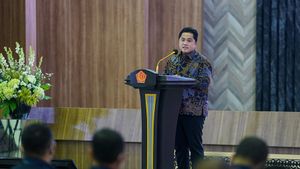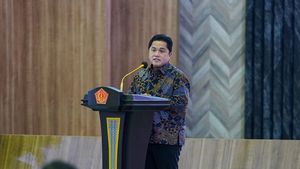JAKARTA - Rusdianto Matulatuwa, the attorney for the former President Director of PT CLM Helmut Hermawan said that the police had difficulty understanding civil and administrative issues in mining disputes.
He conveyed this, referring to the case between PT APMR and PT Assera Mineralindo Investama, which reached the company's forced struggle to criminalize the former President Director of PT CLM Helmut Hermawan.
"The essence of this problem is that the police fail to understand and are unable to distinguish which are civil and administrative issues. Thus, the certainty of the ultimum remedium principle in the Helmut Hermawan case has actually turned into premium remedium. This is criminalization," Rusdi said in Jakarta, Monday, April 17. "When this is an administrative problem, especially mining problems, ESDM is an important thing to get into valid information. This is just an ESDM, there are no complaints, RKAB even keeps coming out," he said again.
For this reason, his party has now made legal efforts returned to his principle, starting from an initial agreement between related parties.
"The reason is that the police interpret that there is a criminal act in the PT CLM business dispute. This means that we were deliberately trapped in a criminal process. So it is true that it will be proven wrong in court. Is that the framework of criminalization by the current police institution?" he said.
As is known, Helmut Hermawan is still in the custody of the South Sulawesi Regional Police and is in a sick condition, however, the Dirkrimsus Polda Sulsel Kombes Pol Helmi Kwarta Rauf was reluctant to give him the opportunity to seek proper treatment.
Related to this, Rusdianto admitted that he had sent a letter and reported it to Komnas HAM, Irwasum, Propam Division and Kompolnas but only Komnas HAM responded to the problems faced by his client.
Responding to this, University of Indonesia Criminal Law expert Eva Achjani Zulfa said that in the basic context of unlawful acts, a basic case is one concept that the agreement is a civil domain, so the completion of the civil agreement or verifying it becomes more important than the context of criminal law.
"This, which I mentioned earlier, is prejudical in Article 81 of the old Criminal Code, which actually requires that. Namely, ensuring whether this element against the law can or is not fulfilled. Because if it is said that this has not been verified, it is actually difficult for law enforcers to determine whether the elements in the articles shown can be fulfilled or not, or not, that is the fulfillment," he said.
اقرأ أيضا:
For this reason, he suggested that law enforcement officials should refrain from using criminal law. Namely refraining from using criminal law waiting for the context of other legal settlements to be verified first in the context of both civil and in the PTUN.
"There is a view that every report should not be rejected, it must be accepted. But actually the mechanism within the police itself should first screen the incoming cases, whether the solution mechanism must then go through a criminal justice process or actually this is not a criminal event. Because the main filter context will be a mandate to law enforcers if we read in Article 109 of the Criminal Procedure Code. If it is not fulfilled, it must be dismissed, the context will be terminated earlier, it will be better."
"I think this case is related to mining, mining contract or mining licensing issues, so the context of the Administrative Court is the main thing. That is what is called a wise action, rather than forcing yourself to process the crime, which in the end has elements, especially elements of actions that violate the law, we doubt the fulfillment," he said again.
The English, Chinese, Japanese, Arabic, and French versions are automatically generated by the AI. So there may still be inaccuracies in translating, please always see Indonesian as our main language. (system supported by DigitalSiber.id)















